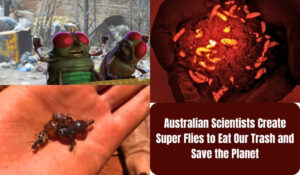Super Flies to Eat Our Trash and Save the Planet!

Introduction
A groundbreaking initiative by Australian scientists at Sydney’s Macquarie University aims to revolutionize waste management by genetically engineering black soldier flies to consume a wider variety of organic waste. This innovative project not only seeks to tackle the mounting problem of waste disposal but also aims to reduce the environmental impact of methane emissions from landfills. By enhancing the capabilities of these flies, the researchers hope to create a sustainable solution that benefits both the environment and the economy.
The Problem with Waste Management
Growing Waste Disposal Issues
The world is grappling with an ever-increasing amount of waste. Traditional waste management methods, such as landfills and incineration, are proving to be insufficient and environmentally harmful. Landfills, in particular, are a significant source of methane emissions, a potent greenhouse gas that contributes to climate change.
Environmental Impact of Landfills
Landfills release large quantities of methane due to the anaerobic decomposition of organic waste. Methane is approximately 28 times more effective at trapping heat in the atmosphere than carbon dioxide, making it a major concern in the fight against global warming. Finding alternatives to landfill disposal is crucial to mitigating these emissions.
The Role of Black Soldier Flies
Existing Use of Black Soldier Flies
Black soldier flies are already employed commercially for their ability to digest organic waste. These insects are efficient waste consumers, capable of eating double their body weight each day. Their larvae are used as a protein-rich feed for animals, highlighting their economic value.
Genetic Engineering for Enhanced Capabilities
Dr. Kate Tepper leads the research at Macquarie University, focusing on genetically modifying black soldier flies to broaden their diet and improve waste breakdown efficiency. By tweaking their genetics, the team aims to expand the range of waste the larvae can consume, including contaminated and toxic waste.
The Science Behind the Innovation
Genetic Modifications
The research involves altering the flies’ genetic makeup to enhance their digestive capabilities. This includes enabling the larvae to break down a wider variety of organic materials and increasing the efficiency of waste conversion.
Potential By-Products
The process of waste digestion by genetically engineered black soldier flies produces valuable by-products such as fatty compounds and enzymes. These can be used in the production of biofuels, lubricants, high-grade animal feeds, textiles, and pharmaceuticals, adding economic value to the waste management process.
Commercialization and Implementation
EntoZyme: The Spin-Off Company
To commercialize this technology, the research team has established a spin-off company called EntoZyme. The company aims to introduce the first genetically engineered flies into waste treatment facilities by the end of the year.
Pilot Projects and Future Plans
Initial pilot projects will focus on integrating these super flies into existing waste treatment systems. The goal is to demonstrate the efficacy of the genetically modified flies in improving waste processing and generating valuable by-products.
Addressing Contaminated Waste
Neutralizing Pollutants
One of the most innovative aspects of this research is the potential for genetically engineered flies to consume and neutralize contaminated waste. This involves breaking down toxic substances into less harmful compounds, evaporating pollutants, or accumulating them for safe removal.
Environmental and Economic Benefits
By neutralizing pollutants, the genetically modified flies can help reduce environmental contamination. The clean organic material left behind after waste digestion can potentially be used as fertilizer, providing an additional benefit to agriculture.
Expert Insights
Dr. Kate Tepper’s Perspective
“We are heading towards a climate disaster, and landfill waste releases methane. We need to get that to zero,” said Dr. Tepper, accentuating the desperation of tracking down practical answers for squander the board.
Dr. Maciej Maselko’s Insights
Dr. Maciej Maselko, who oversees the animal synthetic biology lab at Macquarie University, highlighted the potential of insects in addressing global waste management challenges. He noted that black soldier flies are ubiquitous, efficient consumers of waste, and a valuable source of protein for animal feed.
Broader Implications and Future Directions
Scaling Up the Technology
As the technology proves successful in pilot projects, the next step will be scaling up to a broader range of waste treatment facilities. This will involve collaboration with waste management companies and regulatory bodies to ensure safe and effective implementation.
Global Adoption Potential
The success of this project in Australia could pave the way for global adoption. Countries around the world facing similar waste management challenges could benefit from this innovative approach, reducing landfill dependence and mitigating methane emissions.
Ongoing Research and Development
Continued research will focus on further enhancing the capabilities of genetically engineered flies, exploring new waste types they can process, and developing additional by-products. This ongoing innovation will be key to maintaining the project’s relevance and effectiveness.
Conclusion
The pioneering work by Australian scientists at Macquarie University represents a significant step forward in waste management. By genetically engineering black soldier flies to consume a broader range of organic waste, they are addressing both waste disposal challenges and environmental concerns. This innovative approach holds great promise for creating a sustainable future, reducing methane emissions, and generating valuable by-products. As the project progresses, it has the potential to transform waste management practices globally, offering a cleaner, greener solution for the planet.
- The Verge. (2024). Australian Scientists Create Super Flies to Eat Our Trash and Save the Planet
- Macquarie University. (2024). EntoZyme Spin-Off Company
- Environmental Protection Agency (EPA). (2024). Methane Emissions from Landfills